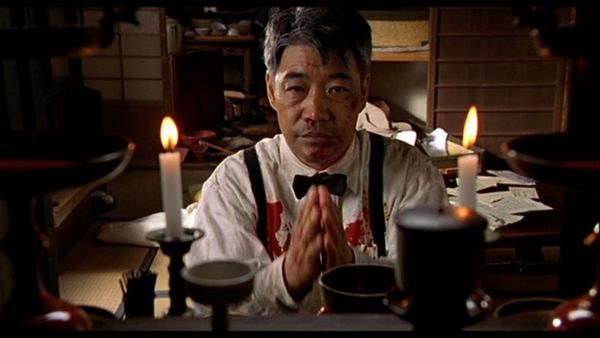Eye For Film >> Movies >> Dr Akagi (1998) Film Review
Dr Akagi
Reviewed by: Angus Wolfe Murray

Shohei Imamura is still making wonderful movies. His humanity, humour and sensual appreciation has not dimmed over the years. The story of a country doctor's battle against hepatitis in 1945 is a pretext to show another side of Japanese life, a long way from The Bridge On The River Kwai.
The soldiers are here, just the same. There is a fortress in the village full of Allied prisoners, reminding everyone - as if rationing doesn't - that there's a war on. Hitler's dead, the Germans have surrendered, but the Imperial army will fight to the last man, or so the voices of authority insist on the radio. Dr Akagi can't listen: it's too painful. He has more important matters to attend to, such as the health of the people. At first, he is seen as a comical figure, running about in his white suit, with a tin hat strapped to his back, a little black bag in one hand, nodding at everyone who passes. On examining the patient, lying on a floor somewhere, surrounded by emotional relatives, his diagnosis is inevitably, "Liver!". The army health officer, a self-important prig, refuses to accept Akagi's analysis of an epidemic and that if something isn't done quickly a great many people will die.

It is a desperate time in Japanese history, only months away from the Hiroshima bomb. In the village, Akagi employs the 20-year-old daughter of a dying prostitute to stop her going on the streets to feed her younger brothers. Sonoko (Kumiko Aso) becomes his devoted assistant and is a girl of courage, generosity and spirit. Imamura's attitude to sex is refreshingly free from the guilt-ridden, killjoy Western approach. Akagi's friend, Umemoto (Jyuro Kara), the superior of the Temple Enmei (Buddhist big cheese), has a healthy appreciation of women's charms, as well as an unhealthy dependence on saki. Another friend, Toriumi, the surgeon, is a morphine addict.
The film encompasses so much, from Akagi's doubts about being a country doctor to his ingenious scientific experiments, from the sudden appearance of a tortured Dutch prisoner to Sonoko's battle with the whale. Far from playing up the comedy to the exclusion of everything else, Akira Emoto brings to Akagi an understanding of humanity's ability to find compassion in the face of defeat. It is a performance worthy of Imamura's own father, a doctor who devoted his life to his work, often quoting the proverb: "Medicine is a benevolent art."
Reviewed on: 19 Jan 2001















